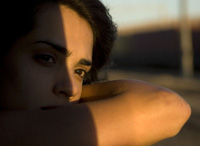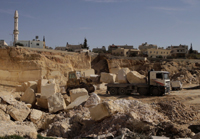At First Glimpse
The 6th edition of the biennial film event Middle East: What Cinema Can Do will unfold from the 29 November to 8 December at the usual venue, Les 3 Luxembourg. The catalogue is at the printers, invitations sent, final preparations in the works, and it is with great anticipation that we would like to share the highlights of the upcoming event.
The Biennial's sixth edition opens as always with the famous trio: Leila Shahid, Michel Warschawski and Dominique Vidal, who kick off the event by presenting the current situation in the Middle East. We are also very pleased to announce the opening film: A World Not Ours by Mahdi Fleifel, who will be present to share this very personal film experience with our audience. This film is an avant-premiere in France and has already been awarded numerous prizes on the festival circuit around the world, including the Peace Film Prize at the Berlinale 2013.
Among the other films on the program, many filmmaker share with us a rather particular insider view of the different countries and issues: Nizam Najjar's Diary from a Revolution takes us into the inner operations of revolution in Libya, Alex Salvatori Sinz's The Shebabs of Yarmouk allows us to see firsthand the issues of staying or leaving as decided among friends who were born and raised in the only Palestinian refugee camp located in Syria, while Alaa Ashkar's Route 60 road movie takes us on a search for identity in the West Bank and Kaveh Bakhtiari's Stop-Over portrays an inside view of Iranian illegal immigrants in Greece.
Our Iranian focus this year revolves around censorship in culture, from women forbidden to sing in public alone (Back Vocal by Mojtaba Mirtahmasb), to a female artist who is not allowed to paint in her male-dominated culture (Going Up Stairs by Rokhsareh Ghaem Maghami). As for cinema, Blames and Flames by Mohammadreza Farzad looks back at the rise of the Islamic revolution when the Iranian authorities destroyed more than a hundred cinema houses, and A Cinema of Discontent by Jamsheed Akrami portrays the international success of Iranian cinema over the past decades and the strict censorship under which they were forced to work.
At the heart of Middle East: What Cinema Can Do is the Israel-Palestine conflict. We noted three main themes resulting from Israeli occupation: the pillage of water (Water by several Israeli and Palestinian filmmakers, The Fading Valley by Irit Gal), the spoliation of stones (Sacred Stones by Muayad Alayan & Laila Higazi) and the theft of books (The Great Book Robbery by Benny Brunner).
As for Palestine, it is sadly focused on getting over and under walls (Infiltrators by Khaled Jarrar), illegaly working in Israel (White Night by Irit Gal), the lack of hope for young people (Before You Were Born by Azza el Hassan and the right to return for those far away from their homeland (Fouad's Dream by Martin Duckworth).
Juliano Mer-Khamis lived the life of a mixed-marriage offspring: Israeli Jewish mother and Palestinian communist father. Revolutionary in his own existence, he continued his mother's work with the children of the Jenin Freedom Theatre allowing Palestinian youth to express themselves on stage. He was assassinated in April of 2011. We pay a final tribute with a short film, Being with Juliano by Emtiaz Diab.
The festival is dedicated to our dear departed friend Stephane Hessel, a constant inspiration for us all, and to the courage of the Middle East youth fighting for democratic values.
back to article list
The 6th edition of the biennial film event Middle East: What Cinema Can Do will unfold from the 29 November to 8 December at the usual venue, Les 3 Luxembourg. The catalogue is at the printers, invitations sent, final preparations in the works, and it is with great anticipation that we would like to share the highlights of the upcoming event.
The Biennial's sixth edition opens as always with the famous trio: Leila Shahid, Michel Warschawski and Dominique Vidal, who kick off the event by presenting the current situation in the Middle East. We are also very pleased to announce the opening film: A World Not Ours by Mahdi Fleifel, who will be present to share this very personal film experience with our audience. This film is an avant-premiere in France and has already been awarded numerous prizes on the festival circuit around the world, including the Peace Film Prize at the Berlinale 2013.
Among the other films on the program, many filmmaker share with us a rather particular insider view of the different countries and issues: Nizam Najjar's Diary from a Revolution takes us into the inner operations of revolution in Libya, Alex Salvatori Sinz's The Shebabs of Yarmouk allows us to see firsthand the issues of staying or leaving as decided among friends who were born and raised in the only Palestinian refugee camp located in Syria, while Alaa Ashkar's Route 60 road movie takes us on a search for identity in the West Bank and Kaveh Bakhtiari's Stop-Over portrays an inside view of Iranian illegal immigrants in Greece.
Our Iranian focus this year revolves around censorship in culture, from women forbidden to sing in public alone (Back Vocal by Mojtaba Mirtahmasb), to a female artist who is not allowed to paint in her male-dominated culture (Going Up Stairs by Rokhsareh Ghaem Maghami). As for cinema, Blames and Flames by Mohammadreza Farzad looks back at the rise of the Islamic revolution when the Iranian authorities destroyed more than a hundred cinema houses, and A Cinema of Discontent by Jamsheed Akrami portrays the international success of Iranian cinema over the past decades and the strict censorship under which they were forced to work.
At the heart of Middle East: What Cinema Can Do is the Israel-Palestine conflict. We noted three main themes resulting from Israeli occupation: the pillage of water (Water by several Israeli and Palestinian filmmakers, The Fading Valley by Irit Gal), the spoliation of stones (Sacred Stones by Muayad Alayan & Laila Higazi) and the theft of books (The Great Book Robbery by Benny Brunner).
As for Palestine, it is sadly focused on getting over and under walls (Infiltrators by Khaled Jarrar), illegaly working in Israel (White Night by Irit Gal), the lack of hope for young people (Before You Were Born by Azza el Hassan and the right to return for those far away from their homeland (Fouad's Dream by Martin Duckworth).
Juliano Mer-Khamis lived the life of a mixed-marriage offspring: Israeli Jewish mother and Palestinian communist father. Revolutionary in his own existence, he continued his mother's work with the children of the Jenin Freedom Theatre allowing Palestinian youth to express themselves on stage. He was assassinated in April of 2011. We pay a final tribute with a short film, Being with Juliano by Emtiaz Diab.
The festival is dedicated to our dear departed friend Stephane Hessel, a constant inspiration for us all, and to the courage of the Middle East youth fighting for democratic values.
back to article list







 page created by mayoco: manage your content
page created by mayoco: manage your content